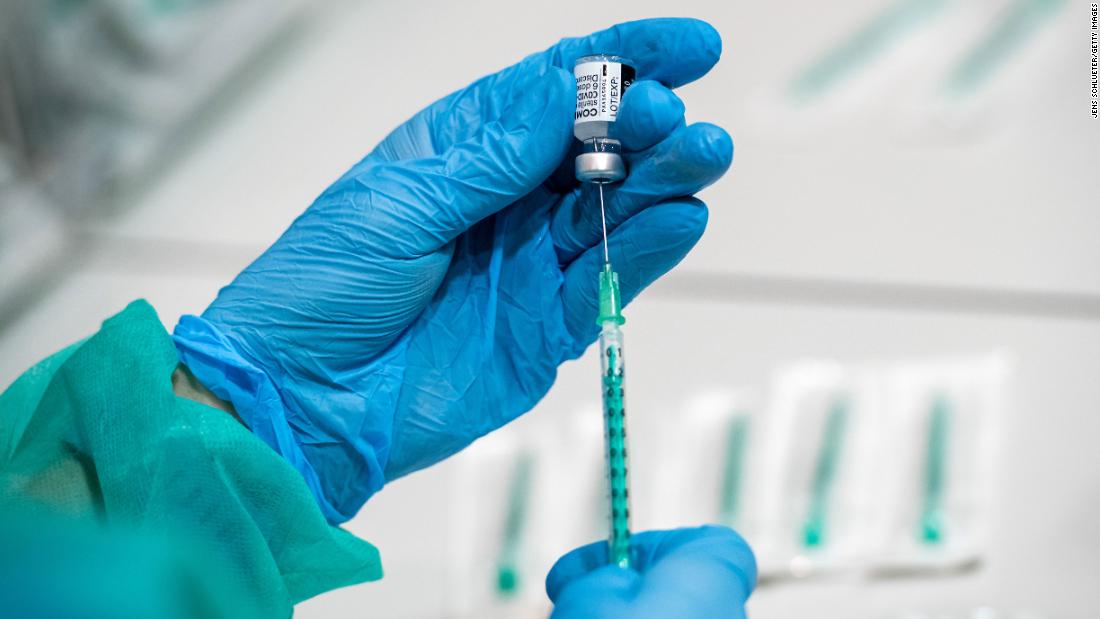
Pregnant women with Covid-19 are at increased risk for severe illness and may be at increased risk for adverse outcomes, such as preterm birth, according to the US Centers for Disease Control and Prevention. The study, along with existing research showing mRNA vaccines are effective in pregnant and lactating women, suggests that the benefits of the vaccines outweigh the risks.
The new study reviewed data on 35,691 pregnant people between December 14, 2020 to February 28, 2021 from the CDC's V-safe smartphone-based surveillance system, as well as data from the CDC's Vaccine Adverse Event Reporting System (VAERS). All participants were pregnant and 16 to 54 years old.
The researchers followed a group within the V-safe system to gather more data on pregnancy outcomes and complications. This registry included 3,958 pregnant participants (out of the 35,691) who had received an mRNA vaccine. They found 827 completed pregnancies, and 115 (13.9%) experienced a pregnancy loss, while 712 (86.1%) resulted in a live birth. Preterm births occurred in 9.4% of participants and only 3.2% of these births were small gestational age. There were no neonatal deaths reported.
There were 221 pregnancy-related adverse events reported to the CDC's VAERS registry, and 46 of them were miscarriages.
"Although not directly comparable, calculated proportions of adverse pregnancy and neonatal outcomes in persons vaccinated against Covid-19 who had a completed pregnancy were similar to incidences reported in studies involving pregnant women that were conducted before the Covid-19 pandemic."
The study also looked at vaccine side effects during pregnancy. Researchers found the most common side effect from the vaccine was pain at the injection site, which appeared to occur more frequently in vaccine recipients who were pregnant. However, headache, muscle aches, chills and fever were reported less frequently by pregnant people.
The researchers say more long-term studies are needed to assess the safety of the Covid-19 vaccine during pregnancy, and that this research should include follow up with a large population who are vaccinated early in pregnancy.
"Continued monitoring is needed to further assess maternal, pregnancy, neonatal, and childhood outcomes associated with maternal Covid-19 vaccination, including in earlier stages of pregnancy and during the preconception period," the researchers wrote. "Meanwhile, the present data can help inform decision making about vaccination by pregnant persons and their health care providers."
Protection for mothers and newborns
In addition to being safe, research released last month showed that the mRNA Covid-19 vaccines from Moderna and Pfizer are also effective in protecting pregnant and lactating women -- and their newborns. The study, published in the American Journal of Obstetrics and Gynecology that also used V-safe data, showed that mothers can pass protective antibodies to newborns.
Researchers at Massachusetts General Hospital, Brigham and Women's Hospital and the Ragon Institute of MGH, MIT and Harvard looked at 131 women who received either the Pfizer/BioNTech or Moderna Covid-19 vaccine. Among the participants, 84 were pregnant, 31 were lactating and 16 were not pregnant or lactating. Samples were collected between December 17, 2020 and March 2, 2021.
The vaccine-induced antibody levels were equivalent in pregnant and lactating women, compared to non-pregnant women. The antibody levels were "strikingly higher" than those resulting from coronavirus infection during pregnancy, the team noted.
"These vaccines seem to work incredibly effectively in these women," said one of the researchers, Galit Alter, a professor of medicine at the Ragon Institute.
In addition, the team found that women passed protective antibodies to their newborns, measured in breast milk and the placenta. Alter said additional research is needed to understand how long those protective antibodies last in newborns.
While the team found similar antibody levels in women vaccinated with each vaccine, Alter said they found higher levels of IgA antibodies in pregnant women who received the Moderna vaccine. She said this particular type of antibody may be transferred more efficiently to babies, for a longer period of time.
"There is some reason to think that having higher levels of IgA immunity might be more protective," Alter noted.
U.S. - Latest - Google News
April 22, 2021 at 08:36AM
https://ift.tt/3n8fxOq
Pfizer and Moderna Covid-19 vaccines do not appear to pose serious risk during pregnancy, research shows - CNN
U.S. - Latest - Google News
https://ift.tt/2ShjtvN
Shoes Man Tutorial
Pos News Update
Meme Update
Korean Entertainment News
Japan News Update
Bagikan Berita Ini














0 Response to "Pfizer and Moderna Covid-19 vaccines do not appear to pose serious risk during pregnancy, research shows - CNN"
Post a Comment